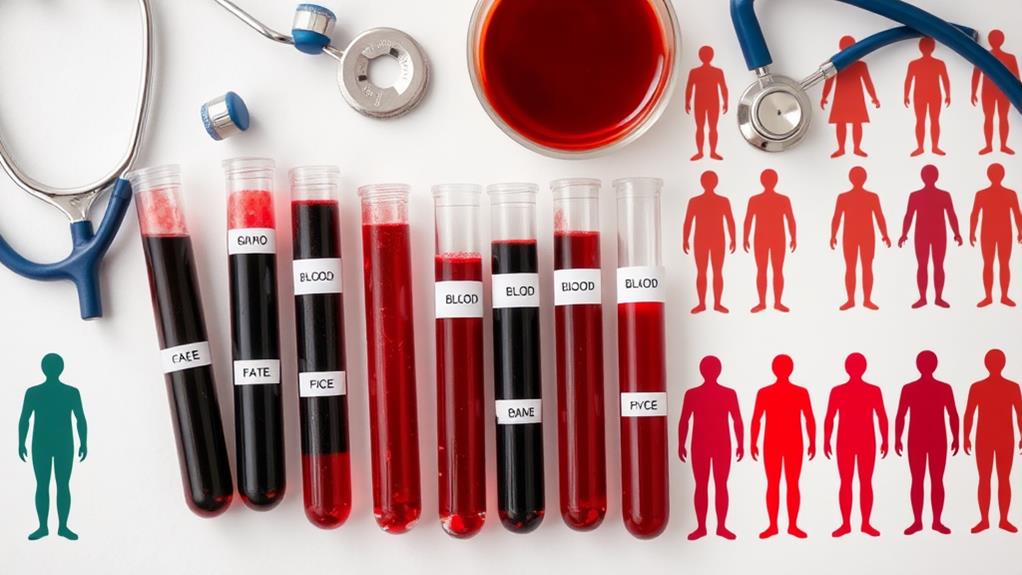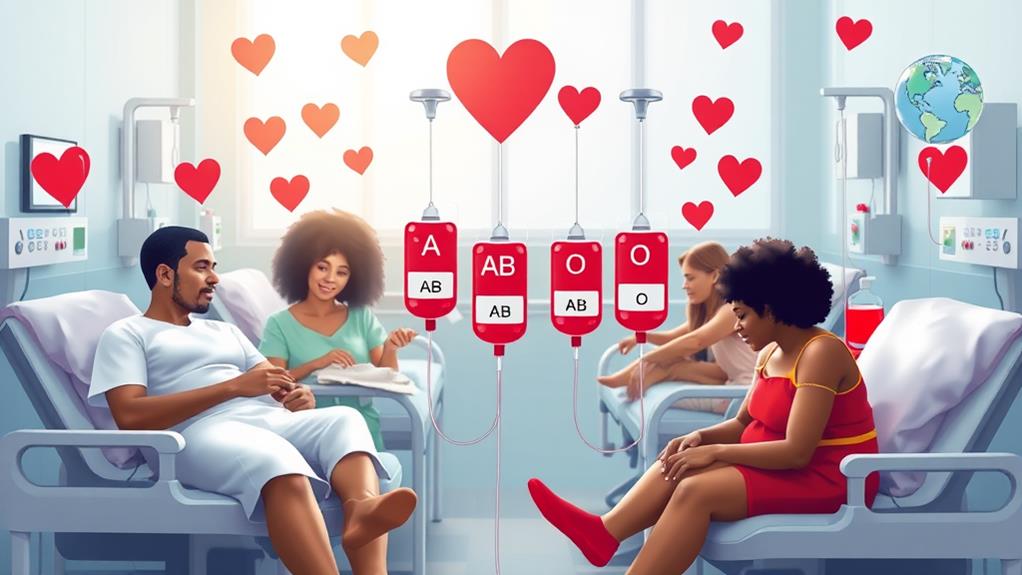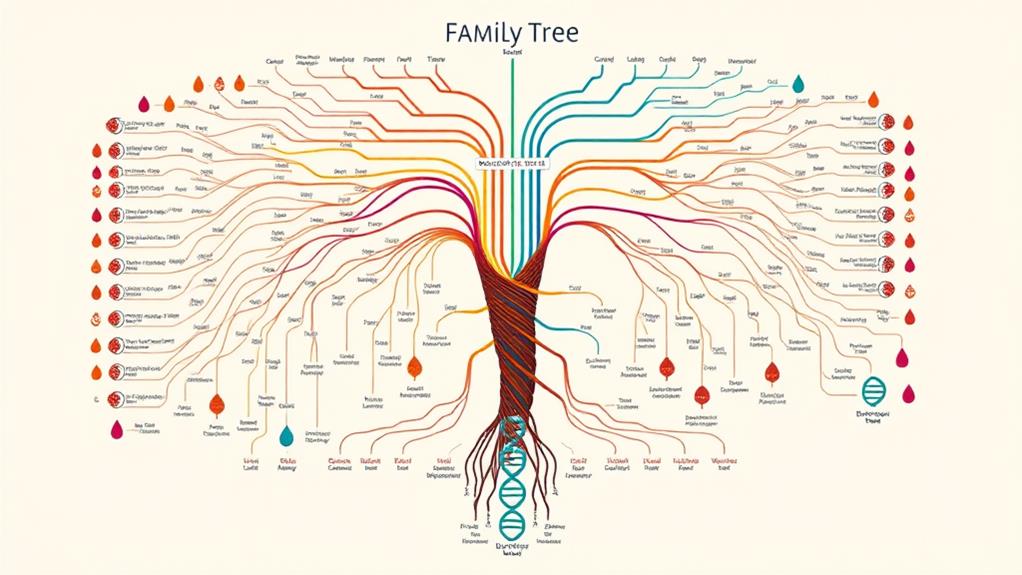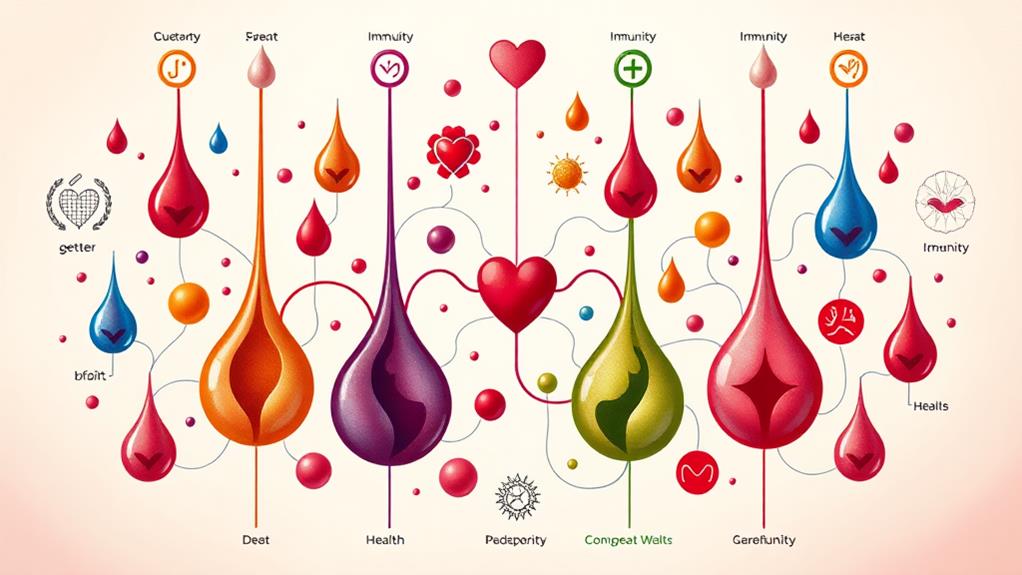Understanding your blood type isn't just a matter of curiosity; it can greatly impact your health and safety. Whether you're facing a medical emergency or considering blood donation, knowing your specific type can play an essential role. Each blood type carries unique characteristics and implications that you might not be aware of. For instance, did you know that certain blood types are more compatible for transfusions, while others can indicate potential health risks? The nuances of blood types can be surprising, and the implications for your life may be more profound than you think.
Importance of Knowing Your Blood Type

Knowing your blood type can save your life in an emergency. When you need to receive red blood cells through blood transfusions, compatibility with the donor's blood type is vital. For instance, if you're A-, you can only receive A- or O- blood. That's why having blood type awareness is so important!
Understanding your blood type doesn't just help you; it also allows you to help others. If you know your blood type, you can donate blood to specific recipients who need it. Some people are universal recipients, meaning they can accept any blood type, but most of us have certain compatibility rules.
Did you know that about 16 million blood components are transfused every year in the U.S.? That's a lot of people relying on blood donations!
By knowing your blood type, you're more likely to participate in blood donation drives, helping maintain a stable blood supply for those in need. So, go ahead and check your blood type—it could be the key to saving a life, even your own!
Plus, being a blood donor makes you a superhero in your community!
Overview of Blood Type Characteristics
Understanding blood types is fundamental to grasping how they impact health and medical procedures. There are four main blood types: A, B, AB, and O. Each can be either Rh-positive or Rh-negative, giving us a total of eight common blood types.
You might be surprised to learn that type O negative blood is the universal donor, meaning it can be given to anyone, while AB positive is the universal recipient. This means folks with AB positive blood can receive from all types—pretty lucky, right?
About 38% of people have O positive blood, making it the most common type, while only about 7% have the rare blood type O negative. The presence or absence of certain markers on red blood cells makes blood types compatible or not. If you mix incompatible blood types, it can lead to serious issues with your immune system, which is definitely not good news.
Knowing your blood type can help in emergencies or when donating blood. It's like having a secret superhero power—understanding your blood type can save lives!
Universal Donor and Recipient Facts

When it comes to blood transfusions, recognizing the roles of universal donors and recipients can be a lifesaver. Did you know that O negative blood is the universal donor? That means it can be given to anyone, regardless of their blood type, without causing an immune response. This is super important in emergencies when time is of the essence.
However, only about 7% of the population has O negative blood, making it a rare gem!
On the flip side, if you have AB positive blood, congratulations! You're a universal recipient. This means you can receive blood from all ABO and Rh types. Sounds easy, right?
But here's the catch — only less than 4% of people in the U.S. have AB positive blood. So, while you can take blood from anyone, finding it can be a bit tricky!
Being aware of these facts helps guarantee effective transfusion practices. In a medical emergency, knowing who can give and receive blood can make a huge difference in patient outcomes.
Rare Blood Types Explained
Rare blood types play an essential role in the world of transfusions, yet they're often overlooked due to their limited availability. For example, only about 1 in 167 people have AB negative blood, and less than 2% of the population has B negative blood. These rare blood types usually lack common antigens, making them unique. That absence can be critical for patients needing specialized transfusions, as they require compatible donors.
Imagine needing a special ingredient for a recipe and finding that it's not in your pantry! This is what hospitals face when rare blood types are needed. Groups like Duffy, Kell, Lutheran, and Kidd aren't well-represented in blood banks, leading to challenges in finding the right match.
Did you know that the global distribution of blood types varies? Type O is the most common, but rare blood types might be more common in some ethnic groups. That's why diverse blood donations are so important!
If you ever get the chance, consider donating. You might just help someone who needs that special AB negative or B negative type. Plus, you could be a universal plasma donor, and that's pretty cool!
Genetic Inheritance of Blood Types

Blood types aren't just about compatibility for transfusions; they're also determined by genetics. Your blood type comes from your parents, just like your eye color or hair type. The ABO blood group system has four main types: A, B, AB, and O. Each type depends on specific antigens present or absent on your red blood cells. When you were born, each of your parents contributed one of two ABO alleles. This combination decided your blood type!
But that's not all! The Rh factor, which is either positive (+) or negative (-), is inherited separately from the ABO blood groups. It can even affect pregnancy outcomes and how your body reacts to certain treatments. So, if you have a positive blood type, there's a good chance that at least one of your parents does too.
Understanding your genetic inheritance is important. It helps you know your medical history and possible health risks.
Blood Type Compatibility in Transfusions
Understanding blood type compatibility is essential for safe transfusions. You may not realize it, but knowing your blood type can make a big difference in an emergency. For instance, if you have type A+, you can receive blood from A+, A-, O+, and O- donors. But if you're A-, you can only receive from A- and O-. That's why compatibility testing is vital before any transfusion.
Now, let's talk about the stars of the show! Type O negative is the universal donor, meaning it can be given to anyone without causing problems. This makes it super important in emergencies when time is tight.
On the flip side, type AB positive is the universal recipient, which means you can receive red blood cells from any type. Lucky you!
Don't forget about the Rh factor—it's another piece of the puzzle. Rh-negative patients need Rh-negative blood, while Rh-positive folks can take both Rh-positive and Rh-negative blood.
Health Implications Linked to Blood Type

Your blood type can markedly impact your health in various ways. For instance, if you have Type A blood, studies suggest you might face a higher risk of heart disease. On the flip side, Type B is linked to a greater chance of pancreatic cancer.
But don't worry too much! If you're Type O, you're in luck; this blood type often comes with a lower risk of blood clotting disorders, which is great for your heart.
Now, if you're Rh-negative, it's important to know that you might need a special treatment called Rh immunoglobulin during pregnancy if you're carrying an Rh-positive baby. This helps prevent complications that could arise.
Also, your blood type can affect how you respond to certain medications. Knowing your blood type is vital, especially in emergencies!
And let's not forget about familial health risks. Understanding blood typing can help you spot patterns in your family's health history, making it easier to manage your own health.
